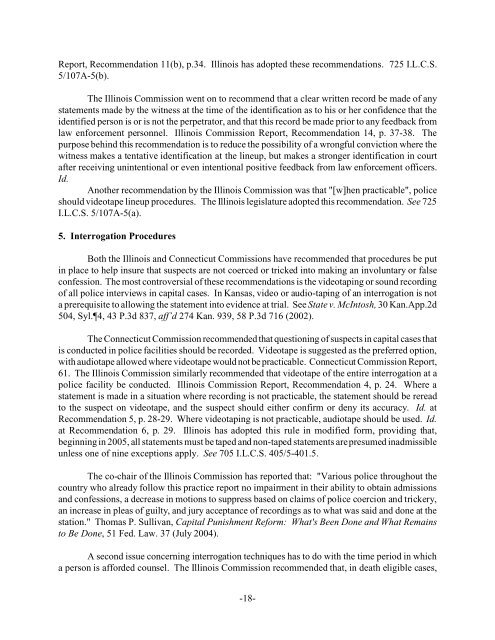report of the kansas judicial council death penalty advisory
report of the kansas judicial council death penalty advisory
report of the kansas judicial council death penalty advisory
You also want an ePaper? Increase the reach of your titles
YUMPU automatically turns print PDFs into web optimized ePapers that Google loves.
Report, Recommendation 11(b), p.34. Illinois has adopted <strong>the</strong>se recommendations. 725 I.L.C.S.<br />
5/107A-5(b).<br />
The Illinois Commission went on to recommend that a clear written record be made <strong>of</strong> any<br />
statements made by <strong>the</strong> witness at <strong>the</strong> time <strong>of</strong> <strong>the</strong> identification as to his or her confidence that <strong>the</strong><br />
identified person is or is not <strong>the</strong> perpetrator, and that this record be made prior to any feedback from<br />
law enforcement personnel. Illinois Commission Report, Recommendation 14, p. 37-38. The<br />
purpose behind this recommendation is to reduce <strong>the</strong> possibility <strong>of</strong> a wrongful conviction where <strong>the</strong><br />
witness makes a tentative identification at <strong>the</strong> lineup, but makes a stronger identification in court<br />
after receiving unintentional or even intentional positive feedback from law enforcement <strong>of</strong>ficers.<br />
Id.<br />
Ano<strong>the</strong>r recommendation by <strong>the</strong> Illinois Commission was that "[w]hen practicable", police<br />
should videotape lineup procedures. The Illinois legislature adopted this recommendation. See 725<br />
I.L.C.S. 5/107A-5(a).<br />
5. Interrogation Procedures<br />
Both <strong>the</strong> Illinois and Connecticut Commissions have recommended that procedures be put<br />
in place to help insure that suspects are not coerced or tricked into making an involuntary or false<br />
confession. The most controversial <strong>of</strong> <strong>the</strong>se recommendations is <strong>the</strong> videotaping or sound recording<br />
<strong>of</strong> all police interviews in capital cases. In Kansas, video or audio-taping <strong>of</strong> an interrogation is not<br />
a prerequisite to allowing <strong>the</strong> statement into evidence at trial. See State v. McIntosh, 30 Kan.App.2d<br />
504, Syl.4, 43 P.3d 837, aff’d 274 Kan. 939, 58 P.3d 716 (2002).<br />
The Connecticut Commission recommended that questioning <strong>of</strong> suspects in capital cases that<br />
is conducted in police facilities should be recorded. Videotape is suggested as <strong>the</strong> preferred option,<br />
with audiotape allowed where videotape would not be practicable. Connecticut Commission Report,<br />
61. The Illinois Commission similarly recommended that videotape <strong>of</strong> <strong>the</strong> entire interrogation at a<br />
police facility be conducted. Illinois Commission Report, Recommendation 4, p. 24. Where a<br />
statement is made in a situation where recording is not practicable, <strong>the</strong> statement should be reread<br />
to <strong>the</strong> suspect on videotape, and <strong>the</strong> suspect should ei<strong>the</strong>r confirm or deny its accuracy. Id. at<br />
Recommendation 5, p. 28-29. Where videotaping is not practicable, audiotape should be used. Id.<br />
at Recommendation 6, p. 29. Illinois has adopted this rule in modified form, providing that,<br />
beginning in 2005, all statements must be taped and non-taped statements are presumed inadmissible<br />
unless one <strong>of</strong> nine exceptions apply. See 705 I.L.C.S. 405/5-401.5.<br />
The co-chair <strong>of</strong> <strong>the</strong> Illinois Commission has <strong>report</strong>ed that: "Various police throughout <strong>the</strong><br />
country who already follow this practice <strong>report</strong> no impairment in <strong>the</strong>ir ability to obtain admissions<br />
and confessions, a decrease in motions to suppress based on claims <strong>of</strong> police coercion and trickery,<br />
an increase in pleas <strong>of</strong> guilty, and jury acceptance <strong>of</strong> recordings as to what was said and done at <strong>the</strong><br />
station." Thomas P. Sullivan, Capital Punishment Reform: What's Been Done and What Remains<br />
to Be Done, 51 Fed. Law. 37 (July 2004).<br />
A second issue concerning interrogation techniques has to do with <strong>the</strong> time period in which<br />
a person is afforded counsel. The Illinois Commission recommended that, in <strong>death</strong> eligible cases,<br />
-18-

















